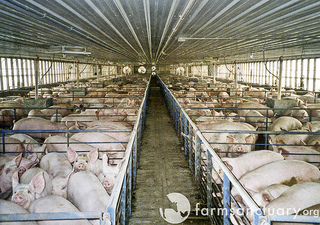
wipheyA bill in North Carolina would make it harder to stop animal abuses — like those documented at a Butterball turkey farm.
Ronnie Jacobs last week became the fifth Butterball employee to plead guilty to cruelty-to-animals charges after workers at a North Carolina factory farm were filmed kicking and beating turkeys in 2011. The animal rights activists who filmed the abuse provided evidence that triggered a law enforcement raid and led to six people being charged.
Mercy for Animals, the animal rights group that shot the undercover video, said there had been no insider information about abuse at the facility before the tape was made. “Unfortunately, every time we send an investigator they emerge with shocking evidence of animal abuse,” said MFA executive director Nathan Runkle.
Are these activists being showered with accolades and gratitude for doing the work that law-enforcement agencies apparently don’t care to do? Hell no! The North Carolina legislature is trying to criminalize their activities.
Under the NC Commerce Protection Act [PDF], introduced last week, anybody who fails to disclose their links to animal welfare groups when applying to work for an agricultural company in order to film abuses could be charged with a misdemeanor on their first offense, and with a felony on their second. If they film any abuses on the job and fail to hand over the unedited footage to law enforcement within 24 hours, they could be found guilty of yet another crime.
The legislation is part of an “ag-gag” trend sweeping America. These bills are criminalizing the act of exposing animal cruelty and, in the process, protecting those who are cruel to animals. From The New York Times:
On one covert video, farm workers illegally burn the ankles of Tennessee walking horses with chemicals. Another captures workers in Wyoming punching and kicking pigs and flinging piglets into the air. And at one of the country’s largest egg suppliers, a video shows hens caged alongside rotting bird corpses, while workers burn and snap off the beaks of young chicks.
Each video — all shot in the last two years by undercover animal rights activists — drew a swift response: Federal prosecutors in Tennessee charged the horse trainer and other workers, who have pleaded guilty, with violating the Horse Protection Act. Local authorities in Wyoming charged nine farm employees with cruelty to animals. And the egg supplier, which operates in Iowa and other states, lost one of its biggest customers, McDonald’s, which said the video played a part in its decision.
But a dozen or so state legislatures have had a different reaction: They proposed or enacted bills that would make it illegal to covertly videotape livestock farms, or apply for a job at one without disclosing ties to animal rights groups. They have also drafted measures to require such videos to be given to the authorities almost immediately, which activists say would thwart any meaningful undercover investigation of large factory farms.
“We would not have been able to see the government corruption and the illegal activity that is currently being prosecuted if there had been an ag-gag bill in North Carolina,” said Vandhana Bala, general counsel for Mercy for Animals.




